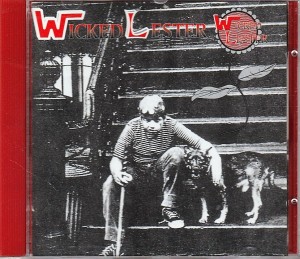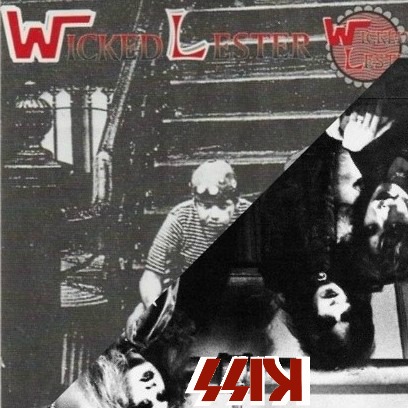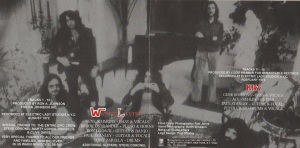The KISS RE-REVIEW SERIES Part 1:
For once, it did not all start with a ![]() .
.
 Wicked Lester (1972 unreleased album) & the Eddie Kramer demos (1973) (CD bootleg “promo” with “Epic” logo)
Wicked Lester (1972 unreleased album) & the Eddie Kramer demos (1973) (CD bootleg “promo” with “Epic” logo)
Stanley Eisen and Chaim Witz were two young New York musicians who didn’t particularly care for one another. They met via guitarist Stephen Coronel, a mutual friend and bandmate of Witz. Chaim, who came to the United States from Israel at the age of eight, changed his name to Gene Klein. Stephen Coronel told Gene that young Stanley wrote songs too. Unimpressed, Gene commanded, “Oh yeah? Play one.” Stanley played a prototype called “Sunday Driver”, but the encounter left a foul taste in his mouth.
Coronel eventually succeeded in bringing his two friends together, when Stanley Eisen joined their band Rainbow. In was 1971, and Ritchie Blackmore had yet to form the most famous Rainbow of them all, but even so they needed a more unique name. They already knew of one other band using the name Rainbow. Both Paul and Gene had their sights set on bigger things than just New York City. They wanted something original, and settled upon Wicked Lester. They’d also drop their “ethnic sounding” real names in favour of the handles “Paul Stanley” and “Gene Simmons”. They collected together some material they’d written and focused on their originals. The lineup consisted of Stanley and Coronel on guitars, Simmons on bass, Brooke Ostrander (RIP, FYC) on piano and horns, and Tony Zarella on drums.
Wicked Lester performed only two gigs before an opportunity was offered by Ron Johnsen, a resident sound engineer at Electric Lady studios. He saw something in the band, and put up the funds for some demo recordings. Eventually, Epic had their curiosity piqued enough to buy the demos and agree to do make an album. They had only one condition: Get rid of Stephen Coronel. Thus, the man that brought Gene Simmons and Paul Stanley together was fired from the band he shared with them.
Coronel was replaced by a player named Ron Leejack, and recording of the album commenced. The majority of tracks were Simmons/Stanley (and sometimes Coronel) originals, with a handful of covers. To cut a long story short, upon completion, Epic shelved the album and deemed it not good enough to release.
They were right to do so.
Only three tracks have ever been released officially, on the 2001 Kiss Box Set: “Keep Me Waiting”, “She”, and “Love Her All I Can”. The rest are only available on very poor sounding bootleg discs. Even without the full fidelity of a proper release, one can tell from the available bootlegs that the album Wicked Lester was best left in the shadows. When Kiss seemed to emerge fully-formed in 1974, nobody had witnessed their growing pains.
The running order of various bootlegs differ. The red-packaged “Epic promo CD” (surely not) begins with the familiar “Love Her All I Can”, best known as one of Kiss’ early classics from 1975’s Dressed To Kill. The unfocused Wicked Lester original sounds like a hippie commune on speed. Simmons today describes their sound as “like a cross between Three Dog Night and the Doobie Brothers.” Throw in a healthy dose of acid. Who knows where that came from, Simmons being so proudly anti-drug.
An obscure cover “Sweet Ophelia” (Barry Mann/Gerry Goffin) really demonstrates how far out in left field everybody was. It’s mildly disconcerting how well Paul Stanley fits the hippie vibe, far removed from his future Starchild persona. A Stanley original “Keep Me Waiting” bears little resemblance to the style his is known for. Though one could imagine the guitar solo section as part of a Kiss song, “Keep Me Waiting” is a delirious concoction of congas and horns. Simmons’ “Simple Type” is more straightforward. No annoying extra accoutrements. No hooks either, or any balls, but it’s one of the earliest examples of Gene Simmons and Paul Stanley sharing lead vocals on a song. Even at this early stage, it was clear that Paul Stanley possessed a mighty throat.
“Simple Type” merges with the flutes and tambourines of “She”. Flutes and tambourines, on “She”?! Yes, this future Kiss grinder is set to the sultry sounds of more hippie instrumentation, to go with the organ and shakers. As the song fades out, you can just hear the potential it had. This potential is nowhere to be found on “Too Many Mondays” (Barry Mann/Cynthia Weil), light and flaky. “What Happens in the Darkness” (Tamy Lester Smith) is all but indescribable. Deep Purple Mk I gone terribly wrong, but with Paul Stanley leading the choir instead of Rod Evans going it alone. Tougher and better is “When the Bell Rings” (Austin Roberts/Christopher Welch) which again features Paul and Gene singing together. This time, Gene utilizes his early high rasp, also heard on Kiss tracks like “Goin’ Blind” and “Let Me Go, Rock and Roll”. Sounding a bit more like our beloved demon, “When the Bell Rings” is actually listenable. Paul Stanley’s dainty “Molly” brings the flutes back into the picture, and the sooner it’s over the better. A cover of The Hollies’ “(We Want To) Shout it Out Loud” is not bad. And it lent its title to something much better later on.
The “Epic promo” CD has terrible tape bleed-through. It’s clearly a copy of a copy, generations down. The cheap paper cover belies its actual bootleg manufacture. It’s also missing a song called “Long, Long Road”, a soft country track that was recorded but perhaps cut from the intended album. That’s right — soft country.
Epic passed on the Wicked Lester album, which was mixed and even had cover art selected. The boy was their mascot, “Wicked Lester”. The cover art was originally intended for another band called Laughing Dogs. Now that the album was shelved (and since Simmons and Stanley were the clear leaders of the group) the fates of the others were pre-determined. Paul and Gene began looking for new members, and experimenting with makeup. They wanted a strong, singular image, not five guys who looked like the line at the local soup kitchen. They also wanted a focused direction, and that was to be hard rock a-la The Who, Cream and Led Zeppelin.
An experienced drummer (his band Lips had an album) named Peter Criscoula was first to heed the call. The new Wicked Lester was a power trio consisting of Peter, Gene and Paul, who rehearsed in a loft located at 10 East 23rd Street in Manhattan. The sound was incomplete: a lead guitarist was needed. Auditions were held at the same loft. Legend has it that Bob Kulick (who features into the story much later) was about to get the gig, when they were rudely interrupted. A spaced out guy with one red and one orange sneaker had plugged in and started wailing away. Paul Frehley snatched the gig at the last minute, and Kiss was born.
The loft where Kiss was born. 10 East 23rd Street, photos by Mike Lukas.
The new focus became apparent when the re-named band entered Electric Lady one more time, in March of 1973, with legendary producer Eddie Kramer. The band cut five new originals: “Deuce” (Simmons), “Strutter” (Stanley/Simmons), “Cold Gin” (Frehley), “Watching You” (Simmons), “Black Diamond” (Stanley). Each of these songs later made it onto Kiss albums in 1974. They had the goods.
The Kramer demos sound better on this CD than the Wicked Lester tracks. A different, younger tape generation would be the probable source. Only two of these demos (“Strutter” and “Deuce”) have been released officially, on the Kiss Box Set. These ferocious tracks are almost completely faithful to the final album arrangements. A few extended solos here, and some longer bits there. Tracks such as “Deuce” are faster than they were later recorded, and more akin to what Kiss sounded like live. Playing to their strengths, keeping things simple, and with Eddie goddamn Kramer at the boards, the band laid down one hell of a demo. This is something that bands today would release officially as their first EP, to build buzz for an album. That wasn’t the strategy in 1973, so the band instead stuck to a regular regimen of songwriting, rehearsals and unforgettable club gigs.
Nine months after their debut gig as Kiss at the Coventry, they signed with Neil Bogart’s Casablanca Records. They had built up a repertoire of roughly 18 originals, including some holdovers from the shelved Wicked Lester: “She”, “Simple Type”, “Keep Me Waiting”, and “Love Her All I Can”. These four songs were whittled out again in the process of coming up with the tracks to record for their first LP.
The Eddie Kramer demos and Wicked Lester album alike are important historical documents. They are pieces of the puzzle coming together, and by the time they got with Kramer, the outline was in place. The only way to go was up.
Today’s rating:
Wicked Lester – 1/5 stars
Eddie Kramer demos – 3.25/5 stars
Original mikeladano.com Wicked Lester review: 2012/08/14








Great post Mike. I know the story well from reading Paul’s book. The Wicked Lester songs are pretty bad. They had no where to go but up. Thanks for the great post and a perfect start to the Kiss story.
LikeLiked by 1 person
Thanks man! Yes the Wicked Lester album is pretty awful. You can see why Gene and Paul have kept it buried.
LikeLiked by 1 person
Ha! I love how they sacked the dude for Epic and the label decided to can the album! Ouch! (though it does sound like a good decision from Epic – so was the decision to sack him judging by his Wikipedia!).
I do like the name Wicked Lester, though.
LikeLiked by 1 person
Oooft. Yeah I didn’t mention Coronel’s recent legal situation. Bad stuff!
LikeLiked by 1 person
Close call for those Kiss chaps!
LikeLiked by 1 person
Fortunately KISS don’t have many of those skeletons in their closet.
LikeLiked by 1 person
Urgh… Wicked Lester. There’s a false start if ever there was one. I know this story well already but this was a great retelling!
LikeLiked by 1 person
Thanks sir! One of the biggest false starts in rock history? Definitely on the list.
LikeLiked by 1 person
Definitely. One of the most famous “unreleased” albums too!
LikeLiked by 1 person
I have a friend at work who still insists Chinese Democracy will never come out. He’s stubborn like that.
But yeah, this is up there as one of the most legendary canned albums. (I would like to hear the Tony Martin version of Dehumanizer….)
LikeLiked by 1 person
Wow that was an amazing history lesson, thank you.
LikeLiked by 1 person
You’re very welcome. I hope each review has some history and context, deserving of this ample discography.
LikeLiked by 1 person
I think that’s the first time I’ve seen Mr. Frehley’s given first name – I guess I never questioned that Ace might have been a stage name!
LikeLiked by 1 person
At one point we will get to (1981) the band had three guys named Paul: Stanley, Frehley, and Carrovello. And Kiss could only have one Paul, so another stage name would be born.
LikeLiked by 1 person
And I suppose Stanley had first dibs on the name!
LikeLiked by 1 person
Indeed! Almost every Kiss member over the years has used a stage name. I think Bruce Kulick and Tommy Thayer are the only two who haven’t.
LikeLike
I was gonna say Eric Singer but then I remembered his real name is Mensinger so I you’re right about Bruce and Tommy.
LikeLiked by 1 person
That’s right! St. John = Norton, Vincent = Cusano…Bruce and Tommy were already established with their own names when they joined Kiss. If Bob Kulick had joined Kiss, I wonder if he would have had a stage name.
LikeLike
Holy mackerel, so cool to get all of that history into one post! Well done! Alas, a 1/5 proved they had miles to go before figuring things out.
LikeLiked by 1 person
Thanks man! And also, always a pleasure to re-use Mike Lukas’ amazing photos of the KISS loft. KISStory right there…and an exclusive to this site!
LikeLike
And Gene can always say he had a Chaim To Fame!
LikeLiked by 1 person
You must be feeling better Mr. Punny! LOL
LikeLike
Today? 70-75% recovery. Still a bit to go. Man, whatever that was really knocked me on my ass.
Just wait for how awesome the puns will be when I’m back to 100% of my fighting form! It’ll be tough to match Witz with me!
LikeLike
Man, add Coronel to the long list of early band members who got fired in place of other/better players.
LikeLiked by 1 person
Otherwise known as the “Pete Best Situation”
LikeLike
Yeah, or if he whined about it, the Dave Mustaine Situation.
LikeLiked by 1 person
HAHAHAHAHAH. Good one. Yes, that’s right.
LikeLike
Also, I love how the pics of the “loft” you included were of the stairwell. Man, in New York City, that stairwell loft would go for $2000 a month!
LikeLiked by 1 person
Yeah probably! But the cool thing is that’s where KISS shot their original photo. If you look carefully you can see the piping behind the band are the same as the one’s in Mike’s photos. So he was actually in that exact spot, only without Kiss!
LikeLike
Probably safer that way…
LikeLiked by 1 person
I actually listened to Gene and Paul saying that Wicked Lester looked like a band from the United Nations….
haha…
never heard of any of this..why start now?
Having said that great write up!
LikeLiked by 1 person
YES! I remember that United Nations quote!!
Why start now? Easy answer — DON’T!
LikeLiked by 1 person
For a Kiss fan, this album is a must even though it blows. I mean, it is a part of Kisstory. But then again, I think there are a couple of songs that I actually like. The “Hair” – ish “What Happens In The Darkness” and “When The Bell Rings” are two songs I quite enjoy.
Great write-up, Mike. It’s not very often we get to read a review of this album.
LikeLiked by 1 person
What do you think, Jon? Think they will ever release it as part of a box set? I think they are just about due for another box set full of the rare stuff we KNOW they still have.
LikeLike
Why is it we all know the guitarists that auditioned for KISS, but not any drummers?
It’s as if Peter automatically had the gig. Didn’t they audition any other drummers?
Gene and Paul are always slagging Pete, so why did they hire him? Was there no one else?
Who were the drummers that auditioned and didn’t make it? Have wondered about this
since the 70’s. Seems like a story no one knows about. Would love to know that story.
LikeLiked by 1 person
They slagged Peter’s work ethic and substance issues. His playing deteriorated over time.
LikeLike
Loved his playing when he was on. His big band influences may not have panned out well with his solo record, but in the context of the band it gave them a propulsion that they wouldn’t have had with a straight ahead four on the floor kind of guy. His jazzy inclinations really gave their early stuff an urgency, “Parasite” is one of my favorite examples. Love those ghost notes on the snare.
LikeLike